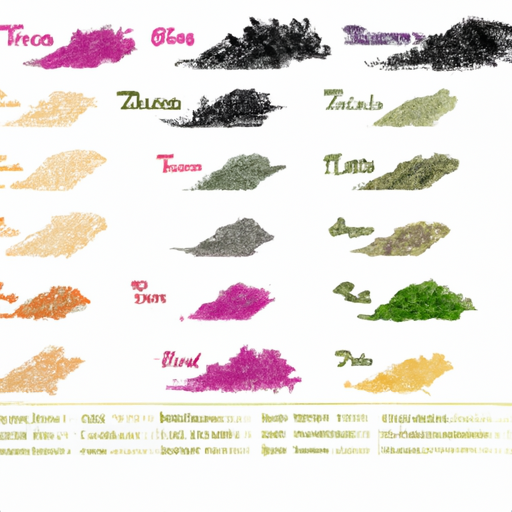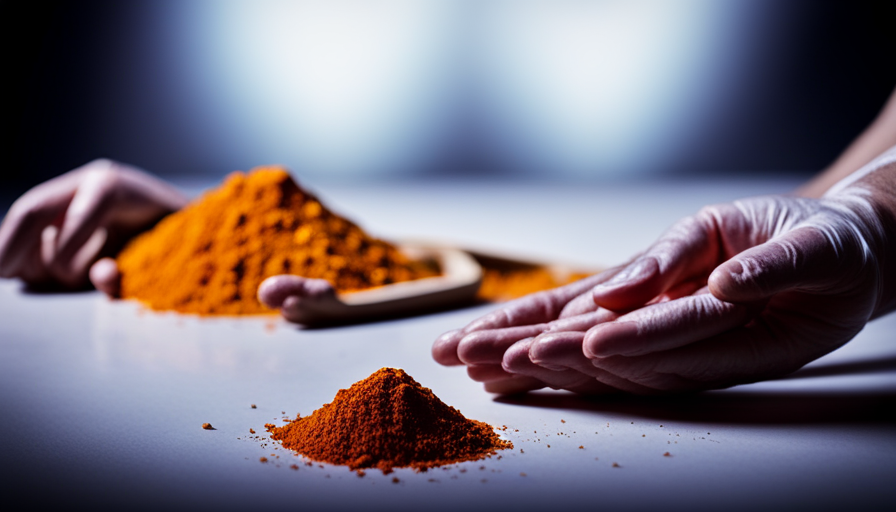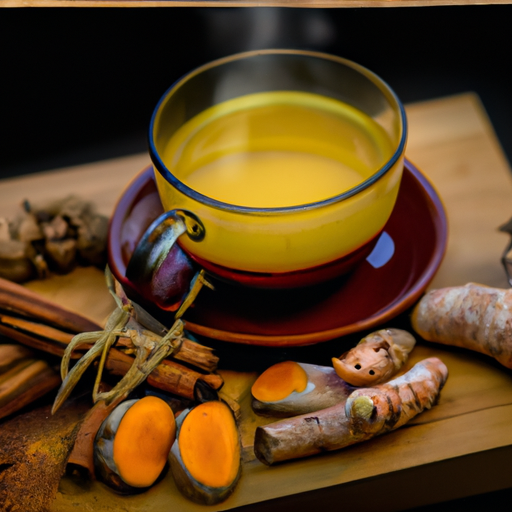Did you know that over 30 million men in the United States suffer from an enlarged prostate? This condition, known as benign prostatic hyperplasia (BPH), can cause urinary problems and have a significant impact on a man’s quality of life.
While there are various treatment options available, including medication and surgery, many individuals are seeking natural alternatives to alleviate their symptoms. In recent years, the potential benefits of tea in shrinking the prostate have gained attention. This article explores the scientific evidence behind different types of tea that may help reduce the size of the prostate.
Green tea, saw palmetto tea, nettle tea, pygeum tea, turmeric tea, and ginger tea are among the options that will be discussed. However, it is important to note that before incorporating any tea into your routine, it’s crucial to consult with your doctor to ensure it is safe and appropriate for your specific situation.
Key Takeaways
- Green tea contains polyphenols with anti-inflammatory and antioxidant properties that have the potential to shrink the prostate.
- Saw palmetto tea has positive effects on the prostate by reducing urinary symptoms, improving urinary flow, and potentially inhibiting the growth of prostate cells.
- Nettle tea, historically used for urinary tract issues, has diuretic properties and may alleviate frequent urination and urinary tract infections. It also has therapeutic effects, anti-inflammatory properties, and supports prostate health.
- Pygeum tea derived from African cherry tree bark supports prostate health by reducing inflammation and alleviating BPH symptoms.
Green Tea
Green tea has been shown to have potential benefits for shrinking the prostate. Studies have indicated that the polyphenols present in green tea have anti-inflammatory and antioxidant properties, which can help reduce prostate size and alleviate symptoms associated with an enlarged prostate.
Additionally, green tea contains catechins, which have been found to inhibit the growth of prostate cancer cells. To make green tea, start by boiling water and letting it cool for a few minutes. Then, pour the hot water over green tea leaves and let it steep for about 2-3 minutes. Finally, strain the tea and it’s ready to be enjoyed.
Moving on to saw palmetto tea, another herbal remedy for shrinking the prostate…
Saw Palmetto Tea
Saw Palmetto Tea has been known to have a positive effect on the prostate. Here are some benefits of saw palmetto:
- Reduces urinary symptoms associated with an enlarged prostate.
- May help improve urinary flow and reduce nighttime urination.
- May inhibit the growth of prostate cells.
- Has anti-inflammatory properties.
To experience these benefits, it’s important to take the appropriate saw palmetto dosage. The recommended dosage varies depending on the form of saw palmetto, but generally ranges from 160 mg to 320 mg per day.
Now, let’s move on to the next tea that’s been shown to have potential benefits for prostate health: nettle tea.
Nettle Tea
Nettle tea has historically been used for urinary tract issues, making it an interesting topic to explore. Research suggests that nettle tea may have potential anti-inflammatory effects, which could be beneficial for individuals with urinary tract problems.
Additionally, there is evidence to suggest that nettle tea may play a role in supporting prostate health.
Historical Use for Urinary Tract Issues
For centuries, people like you have turned to herbal remedies for relief from urinary tract issues. Nettle tea, a popular choice in traditional medicine, has a long history of use for its potential benefits in this area.
Here are some key points to consider:
- Nettle tea has been used in historical remedies for urinary tract issues due to its diuretic properties.
- Traditional medicine often incorporates nettle tea to help alleviate symptoms such as frequent urination or urinary tract infections.
- Its natural compounds, including flavonoids and phenolic acids, may contribute to its potential therapeutic effects.
- Preliminary studies suggest that nettle tea may have anti-inflammatory properties, which could further support its use for urinary tract issues.
With its historical use and potential anti-inflammatory effects, nettle tea offers a promising option for those seeking relief from urinary tract issues.
Potential Anti-Inflammatory Effects
One intriguing aspect of nettle tea is its potential ability to soothe inflammation, like a gentle breeze calming a fiery storm in the body. Research evidence suggests that nettle tea may have anti-inflammatory effects, which could potentially provide various benefits for overall health. Inflammation is a natural response of the immune system to injury or infection, but chronic inflammation can contribute to the development of numerous diseases, including prostate issues. Nettle tea contains compounds such as flavonoids and polyphenols that have been shown to possess anti-inflammatory properties in laboratory studies. While more research is needed to fully understand the potential benefits of nettle tea for inflammation, these initial findings are promising. Transitioning to the role of nettle tea in prostate health, it is important to explore its potential effects on this specific aspect of men’s well-being.
Role in Prostate Health
Discover how nettle tea can support your prostate health and keep you feeling your best. Maintaining a healthy prostate is essential for overall well-being, and diet and lifestyle factors play a crucial role in its maintenance. Here are four ways nettle tea can help maintain prostate health:
-
Anti-inflammatory properties: Nettle tea contains compounds that’ve been shown to reduce inflammation in the body, including in the prostate gland.
-
Antioxidant effects: The antioxidants in nettle tea help protect the prostate cells from oxidative damage, which can contribute to prostate problems.
-
Hormonal balance: Nettle tea may help regulate hormone levels, including those related to prostate health.
-
Stress reduction: Stress and anxiety can negatively impact prostate health. Nettle tea has calming properties that can help reduce stress and promote a healthy prostate.
Transitioning to the next section, let’s now explore the benefits of pygeum tea for prostate health.
Pygeum Tea
Indulge in a cup of Pygeum tea, and let its soothing warmth envelop your senses, bringing relief to your prostate. Pygeum, derived from the bark of the African cherry tree, has been used for centuries to support prostate health.
Studies have shown that this natural remedy has numerous benefits for the prostate. It helps reduce inflammation and may alleviate symptoms of benign prostatic hyperplasia (BPH), such as frequent urination and difficulty in emptying the bladder.
The recommended pygeum dosage is typically 50-100 milligrams per day, but it’s always best to consult with a healthcare professional for personalized advice.
Moving on to turmeric tea, another potent herbal remedy for prostate health, let’s explore its remarkable properties and how it can further support your well-being.
Turmeric Tea
Savor the invigorating aroma and golden hue of turmeric tea as it works its magic on supporting a healthy prostate. Turmeric, a spice derived from the Curcuma longa plant, has been used for centuries in traditional medicine for its various health benefits. Its active compound, curcumin, possesses anti-inflammatory and antioxidant properties that may contribute to prostate health. Studies have shown that curcumin can inhibit the growth and spread of prostate cancer cells, making it a promising natural alternative for prostate health. However, the optimal dosage of turmeric for prostate health is not yet established. It is recommended to consult with a healthcare professional to determine the appropriate dosage and ensure its effectiveness. Transitioning into the subsequent section about ginger tea, let’s explore another natural remedy for prostate health.
Ginger Tea
After discussing the potential health benefits of Turmeric Tea, let’s now turn our attention to Ginger Tea. Ginger has long been valued for its medicinal properties, and research suggests that it may have several potential health benefits.
Studies have shown that ginger possesses anti-inflammatory and antioxidant properties, which could help reduce inflammation and oxidative stress in the body. Additionally, ginger tea has been shown to improve digestion, relieve nausea, and alleviate menstrual pain.
When it comes to dosage recommendations, it’s generally recommended to consume no more than 4 grams of ginger per day. This can be achieved by steeping 1-2 teaspoons of fresh ginger root in hot water for about 10 minutes. However, it’s important to note that individual tolerance may vary, and it’s always best to consult your doctor before starting any new herbal regimen.
By seeking professional advice, you can ensure that ginger tea is safe and appropriate for your specific health needs.
Consult Your Doctor
Make sure to consult your doctor before incorporating ginger tea into your daily routine, as they can help determine the appropriate dosage and ensure it is safe for your unique health needs, just like a compass guiding you on the right path towards wellness. While ginger tea is generally considered safe for most people, there are potential risks to be aware of. Some individuals may experience gastrointestinal discomfort or allergic reactions. It is important to discuss any pre-existing medical conditions or medications you are taking with your doctor to avoid any potential interactions. Additionally, your doctor can provide guidance on alternative treatments that may be more suitable for your specific situation. They can evaluate your symptoms and recommend evidence-based therapies that have shown effectiveness in managing prostate health. Remember, your doctor is your best resource for personalized advice and care.
| Potential Risks | Alternative Treatments |
|---|---|
| Gastrointestinal discomfort | Saw palmetto extract |
| Allergic reactions | Green tea extract |
| Interactions with medications | Tomato-based foods |
| Exercise and lifestyle modifications | |
| Medications such as alpha-blockers |
Frequently Asked Questions
What are the potential side effects or risks associated with drinking green tea for prostate health?
When it comes to the potential side effects and risks associated with drinking green tea for prostate health, scientific evidence is limited. However, it is generally considered safe when consumed in moderation as part of a healthy diet.
How often should I drink saw palmetto tea in order to see potential benefits for my prostate?
To see potential benefits for my prostate, I should drink saw palmetto tea regularly. The dosage may vary, but it is recommended to consult with a healthcare professional for the appropriate amount.
Are there any specific precautions or contraindications to consider when consuming nettle tea for prostate health?
When considering nettle tea for prostate health, it is important to be aware of potential precautions and contraindications. Consult with a healthcare professional to determine if nettle tea is suitable for you.
Can pygeum tea be used as a standalone treatment for prostate enlargement, or should it be combined with other therapies?
Pygeum tea can be used as a standalone treatment for prostate enlargement, but combining it with other therapies may enhance its effectiveness. Alternative treatments should also be considered for managing prostate enlargement.
Is there a recommended dosage or preparation method for turmeric tea to support prostate health?
The recommended dosage of turmeric tea for supporting prostate health is typically 1-2 teaspoons of turmeric powder steeped in hot water for 10 minutes. This preparation method allows for optimal extraction of beneficial compounds.
Conclusion
In conclusion, various types of tea have shown potential in shrinking the prostate. Green tea, with its high levels of antioxidants, has been found to have anti-cancer properties that may help reduce the size of the prostate.
Saw palmetto tea, commonly used to treat prostate issues, has been shown to improve urinary symptoms and reduce prostate size in some studies. Nettle tea may also have a positive impact on prostate health due to its anti-inflammatory properties.
However, it’s important to consult with a doctor before making any changes to your diet or treatment plan. One interesting statistic is that a study found that men with enlarged prostates who took saw palmetto extract experienced a 24% improvement in urinary symptoms compared to those who took a placebo. This highlights the potential effectiveness of saw palmetto tea in managing prostate issues.










